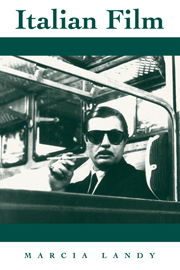Book contents
- Frontmatter
- Contents
- List of Illustrations
- Preface
- Acknowledgments
- Introduction
- 1 Early Italian Cinema Attractions
- 2 National History as Retrospective Illusion
- 3 Challenging the Folklore of Romance
- 4 Comedy and the Cinematic Machine
- 5 The Landscape and Neorealism, Before and After
- 6 Gramsci and Italian Cinema
- 7 History, Genre, and the Italian Western
- 8 La famiglia: The Cinematic Family and the Nation
- 9 A Cinema of Childhood
- 10 The Folklore of Femininity and Stardom
- 11 Conversion, Impersonation, and Masculinity
- 12 Cinema on Cinema and on Television
- Notes
- Bibliography
- Filmography
- Index
Preface
Published online by Cambridge University Press: 01 June 2011
- Frontmatter
- Contents
- List of Illustrations
- Preface
- Acknowledgments
- Introduction
- 1 Early Italian Cinema Attractions
- 2 National History as Retrospective Illusion
- 3 Challenging the Folklore of Romance
- 4 Comedy and the Cinematic Machine
- 5 The Landscape and Neorealism, Before and After
- 6 Gramsci and Italian Cinema
- 7 History, Genre, and the Italian Western
- 8 La famiglia: The Cinematic Family and the Nation
- 9 A Cinema of Childhood
- 10 The Folklore of Femininity and Stardom
- 11 Conversion, Impersonation, and Masculinity
- 12 Cinema on Cinema and on Television
- Notes
- Bibliography
- Filmography
- Index
Summary
Histories of national cinemas are a staple of film studies. What has changed over the course of time is the theoretical and methodological scope of these studies as well as the range of the national cinemas under examination, now extending beyond Hollywood and Europe. In the case of Italian cinema, scholarly research probes, rather than takes for granted, the national form as expressed through writings on modernity, urbanity, geography, regionalism, ethnicity, and sexuality. Instead of automatically assuming the essential character and integrity of a nation, these studies recognize that “cinematography has always been a worldwide craft. Its history ought to be told from two different vantage-points, an international as well as a national one.” It is necessary to “distinguish the ways Italians conceive of themselves and the reasons why we bestow on a given film the label ‘typically Italian.’” Building on these statements by Sorlin, I would suggest that Italian films (and scholarly writings on the Italian cinema) have played a prominent role until recently in producing a collective narrative of the Italian people. My study identifies strands interwoven into this collective narrative, indicating where ostensibly unified elements are only fragments, thus opening the way to understanding fictions of the Italian nation.
In her unraveling of the national narrative, Giuliana Bruno in Streetwalking on a Ruined Map, writes that her study
offers a theoretical meditation on the problems of historiography and addresses the challenge posed by feminist theory to both film history and theory. […]
- Type
- Chapter
- Information
- Italian Film , pp. xiii - xxiiPublisher: Cambridge University PressPrint publication year: 2000

